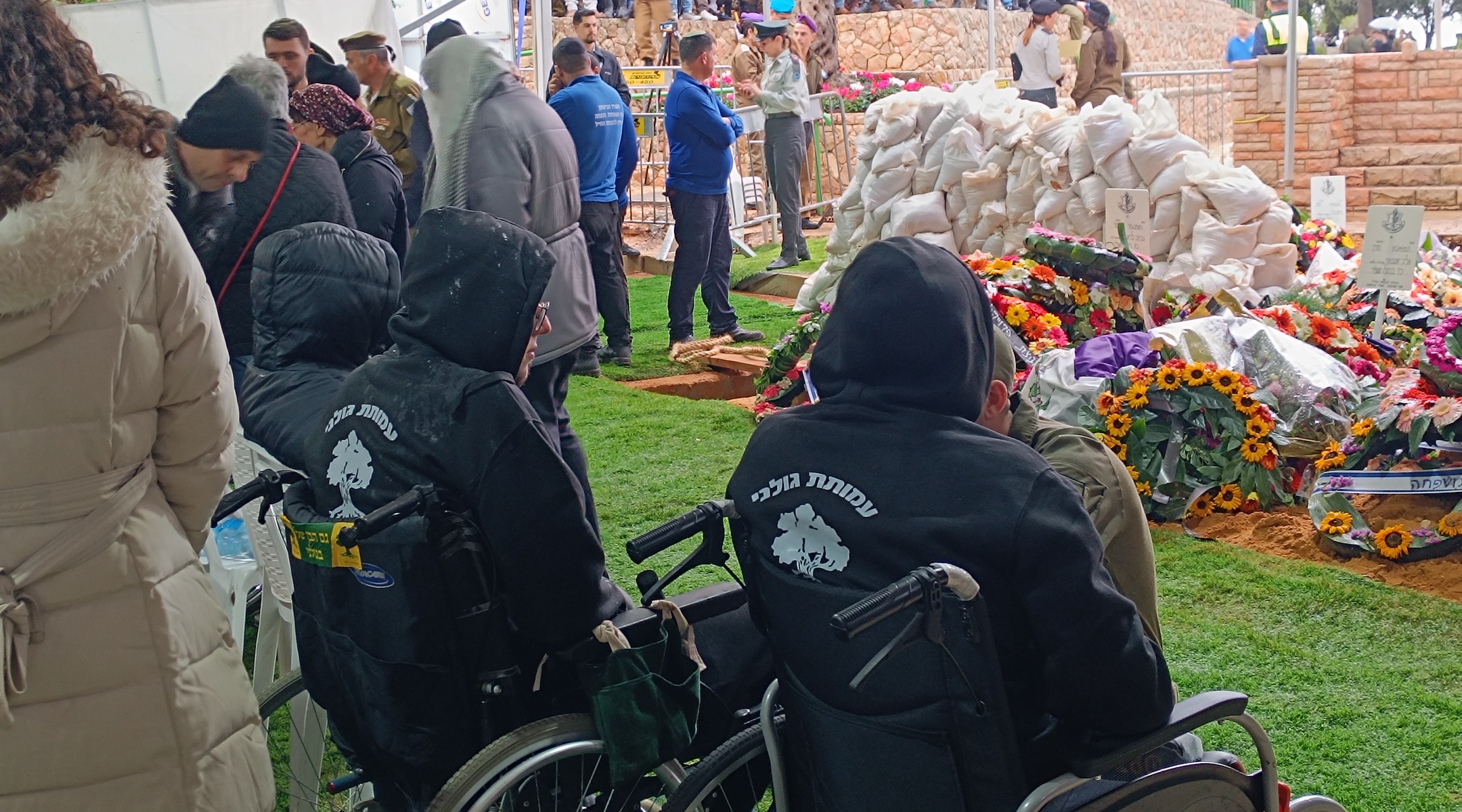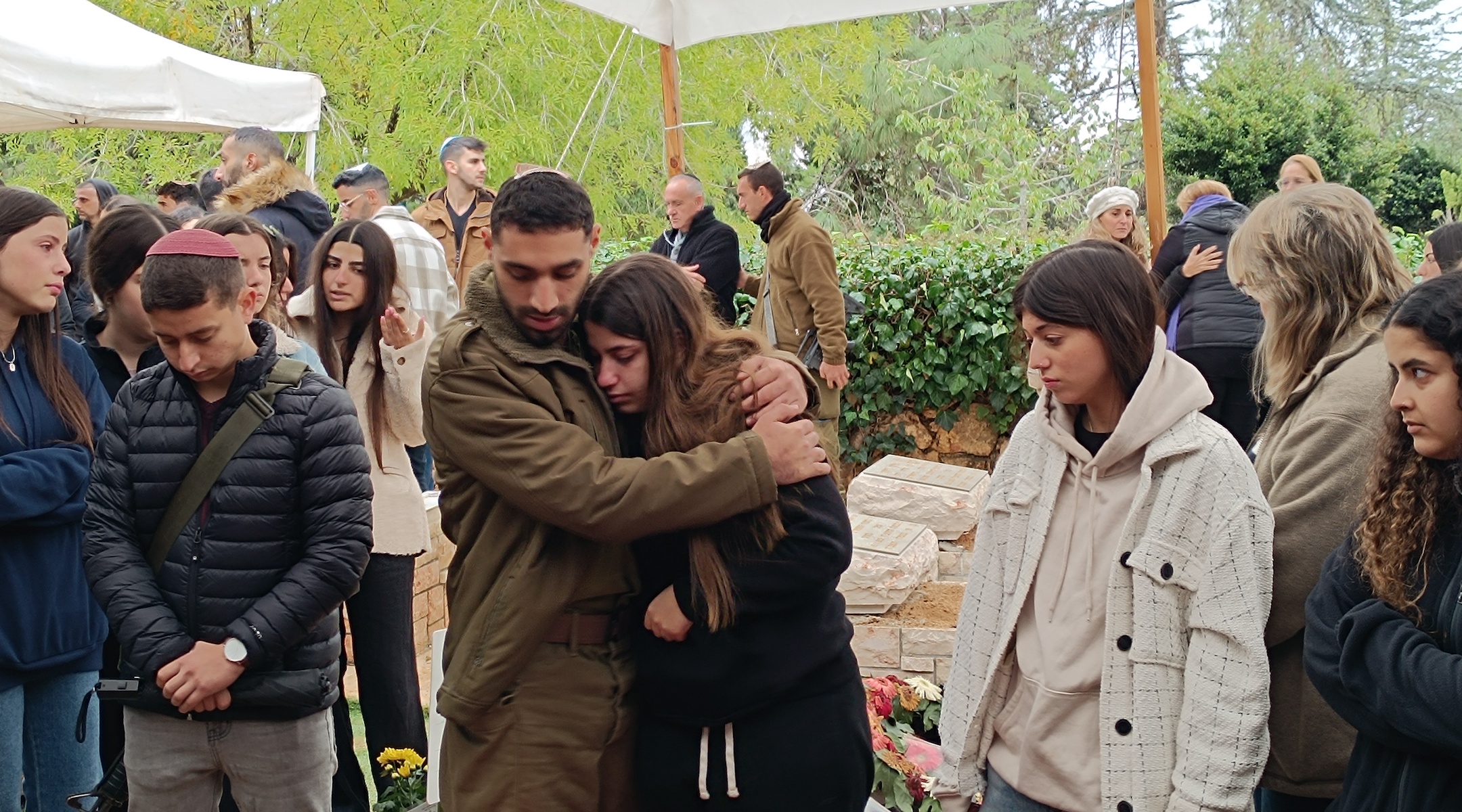‘Nothing will separate between us’: After Israel’s bloodiest day since Oct. 7, thousands pay their respects to a fallen commander
Tuesday’s news has hit the country particularly hard, both due to the number of soldiers killed and the circumstances of the battle

Wounded Israeli soldiers were among the thousands who attended the funeral of Tomer Grinberg, an Israeli officer killed the previous day, at the Mt. Herzl cemetery in Jerusalem, Dec. 13, 2023. (Eliyahu Freedman)
JERUSALEM (JTA) — As rain pounded the gravestones, thousands of people crowded into Israel’s military cemetery on Mt. Herzl to pay their final respects to Lt. Col. Tomer Grinberg.
It was one of many military funerals that day. Grinberg, 35, was the commander of the Golani infantry brigade’s elite 13th battalion, which lost nine soldiers in a fierce battle Tuesday night in the Gaza City-area neighborhood of Shejaiya. Taken together with a tenth soldier killed elsewhere in Israel’s war against Hamas, it was Israel’s deadliest day of fighting since Hamas’ Oct. 7 invasion, which launched the war.
“We are all prepared to give our soul and to die for the State of Israel,” said his father Isaac, whose voice cracked as he recited the Kaddish prayer for his son. “That is Golani, that is Tomer.”
The magnitude of the loss was evident in the funeral’s location, a new section of Mt. Herzl that was opened to accommodate the graves of soldiers killed on Oct. 7 and afterward. Since Israel’s ground invasion of Gaza, 115 Israel Defense Forces soldiers have been killed. Taken together with the casualties on Oct. 7, the military has lost more than 400 troops.
Hundreds of thousands of reservists were called up after Oct. 7, and since the ground invasion began, Israeli families have listened to casualty announcements with anxiety, reading names, looking at pictures and hoping that their loved ones were not among the dead.
“It is very difficult to open the news each day because every time there is news of more soldiers who fell,” said Lior Benisty, an IDF official responsible for supporting bereaved families through the grieving process who was at Mt. Herzl.
In his 15 years of duty, he says nothing has come close to the difficulty of the current period. “It is difficult news for all of us, with each of us sharing in the sorrow of this national mourning,” he said.
Tuesday’s news has hit the country particularly hard, both due to the number of soldiers killed and the circumstances of the battle.
The battle occurred in what the IDF called its “twilight” stage of conquering Shejaiya. In Tuesday’s operation, it sought to eliminate remaining Hamas strongholds in order to establish complete control of the northern Gaza Strip, where the ground invasion began. But amid fighting in the densely-crowded “Casbah” area of the neighborhood, Golani troops were ambushed by an explosion that cut off communication and killed four soldiers. Another five soldiers fell in an ensuing rescue mission.
The ambushes also killed Col. Itzhak Ben Basat, 44, head of the Golani Brigade’s commander’s team and the highest-ranking soldier killed to date in the ground invasion.
In a post on social media, former Defense Minister Benny Gatz, a member of Israel’s war cabinet, wrote that the war is “exacting a heavy, painful and difficult price from us.”
“Every fallen soldier is a scar on all of the state of Israel, and every scar is a reminder of our soldiers’ heroism, and of our need to be worthy as a society of their sacrifice,” he wrote.
Grinberg had fought in Shejaiya in 2014, during Israel’s last ground invasion of Gaza, when 13 soldiers from his battalion were killed in a battle there. On Oct. 7, he led the battle against Hamas terrorists in Kibbutz Nir Oz, one of the border communities that was hit hard in the invasion. Golani lost 40 soldiers that day.
“We knew that it is a privilege to defend our country and it comforts me to know that you would have been complete with yourself with what you did,” said his brother Ziv, who has also been fighting in Gaza and last saw his brother when the two traveled toward the Gaza border on Oct. 7.
In recent weeks, the IDF has shifted the brunt of its force to the southern Gaza city of Khan Younis, where it believes Hamas’ leadership is based. Overall, more than 18,000 Palestinians have been killed in the war, according to the Hamas-run Gaza Health Ministry, a figure that does not distinguish between civilians and combatants. On Oct. 7, Hamas terrorists killed some 1,200 people, largely civilians.

Mourners on Mt. Herzl on Dec. 13, 2023. (Eliyahu Freedman)
Grinberg’s was one of several funerals around the Har Herzl grounds. Rows of graves newly dug in the last month were adorned with fresh flowers, flags of military units, scarves bearing the logos of favorite soccer teams and pictures of the fallen soldiers. At one grave, a family gathered with large balloons to celebrate their newlywed son’s 23rd birthday.
Many of the attendees at Grinberg’s funeral wore military and Golani insignia and included several of the IDF’s top brass, including Defense Minister Yoav Gallant. A significant number of the troops whom Grinberg commanded, and who were injured during the fighting and discharged attended the ceremony.
But there were also moments during the funeral that harkened to the world beyond the war. In her eulogy, Ashira Grinberg, Tomer’s wife, read from a birthday card she and their daughter sent him while he was at the front.
“Tomer, until now and still, a part of you belongs to us — I want to speak for a moment that you will be my Tomer,” she said between sobs. Reading the card, she said, “I believe that you arrived at this moment in order to be in this cursed war, may it end as quickly as possible. Your beard looks good on you and we will celebrate when you return.”
She added, “Nothing will separate between us, even if the world stops one day.”
On social media, a video of Grinberg addressing his troops after Oct. 7 has made the rounds. In the clip, he compares their mission to the 1973 Yom Kippur War, an existential fight for Israel which broke out exactly 50 years before the current conflict.
“So it turns out you are not spoiled,” he said. “It turns out you are no less heroic than them. It turns out you are not the ‘iPhone generation.’ So well done, everyone. I’m proud of everyone here, but this is just the beginning.”
This article originally appeared on JTA.org.
















